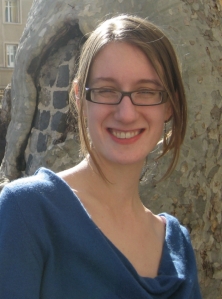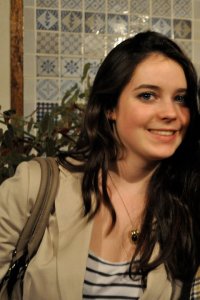French Impressions: Language and literature that rouses and stirs
15 Wednesday Aug 2012
A Woman’s Paris™ in Cultures, Interviews
Tags
Adam Gopnik Paris to the Moon, Alfred Hitchcock films, Anne Lamott Operating Instructions, Carol Reed The Third Man, Cervantes Don Quixote, English language, etymologies, France, French language, George Orwell 1984, Homer's Odyssey, Honor by Mukhtar Mai, language, literature, Madeline books, Maje clothes, Margaret Atwood, Paris, The Boat that Rocked
Share it
The inspired use of language rouses the imagination or stirs us to start writing—we hear from Lauren Ernt on the work of author Margaret Atwood and her observations of human behavior; Clémence Descours dreaming in utopia or dystopia; and Laura Tompkins who, inspired by the humor and blunt honesty in Anne Lamott’s book Operating Instructions, started to write a blog of her own—all are affirmation of the storytellers, writers and poets in all of us. Literary classics, epic love stories, memoirs and great conversations as fodder for our imaginations.
Lauren, on the power of literature, writes: It’s like Margaret Atwood’s characters notice and say the things that we do, but that we might never say out loud. I love her use of language, too. I just want to wrap myself up in them.
Enjoy these French Impressions highlights with links to the full interviews published in A Woman’s Paris.
Lauren Ernt and her passion for literature and language
AWP: Name the books and movies, works of art and music, fashion or cuisine that have inspired you.
 LE: It’s so hard to choose. I love films from the 1930s-1950s, particularly thrillers and film noir. Alfred Hitchcock‘s films are great examples of the aesthetics and storytelling that I love. So is Carol Reed’s The Third Man. Everything about that film gives me chills: the photography is gorgeous, the characters are intriguing, the plot twists unexpectedly. It’s fantastic.
LE: It’s so hard to choose. I love films from the 1930s-1950s, particularly thrillers and film noir. Alfred Hitchcock‘s films are great examples of the aesthetics and storytelling that I love. So is Carol Reed’s The Third Man. Everything about that film gives me chills: the photography is gorgeous, the characters are intriguing, the plot twists unexpectedly. It’s fantastic.
As for literature, Margaret Atwood is my current favorite author. She’s got a way of constructing a story that introduces these seemingly disparate threads, then weaves them together at the very end in a very powerful way. Her observations of human behavior are so precise and so insightful. A friend of mine and I were talking about it once: It’s like Margaret Atwood’s characters notice and say the things that we do, but that we might never say out loud. I love her use of language, too. It’s hard to explain, but I feel a very tactile connection to the words she writes. I just want to wrap myself up in them.
Another inspiring book is, believe it or not, the dictionary. Seriously. I keep one on my kitchen table and can spend hours looking up words and examining their etymologies. Just to think about how the English language (my first language) has developed and changed is fascinating. I do the same thing with my French dictionary. One of my favorite parts about studying French is when I learn a word and try to understand how the word evolved, and then identify where those words have trickled into English in unexpected ways—it really sparks my imagination. For example, generally speaking the French word “pendant” and English word “pendant” mean two different things. The French word means “during” or “while:” the English word refers to a piece of jewelry that one hangs from a chain. These words are spelled the same, pronounced differently, and refer to different concepts or objects. But they have this common idea of hanging somewhere, whether it’s between two points in time or from a chain. This is a purely amateur observation and speculation, but it’s so much fun to think about. (Read Lauren Ernt’s full interview published in English.)
Clémence Descours on her definition of style
AWP: Name the books and movies, works of art and music, fashion or cuisine that have inspired you.
 CD: I’ve been inspired by 1984, by George Orwell. It is a dystopia, an imagined place where everything is unpleasant, denouncing the boundary between social classes, the manipulation of the crowds, the incitation of tattling. Cervantes’ Don Quixote because the madness of the main character is so poetic, and I think there is a beauty in the way he is absolutely disconnected with the reality. Homer’s Odyssey shows the archetypal hero, half god and almost perfect. I like reading utopia or dystopia; it makes me dream. In the name of Honour, by Mukhtar Mai, inspires me often. The book contains memoirs of a Pakistani who has lived an awaken nightmare, just because she was born as a woman in the wrong place at the wrong time. She has fought for women’s rights, which always reminds me of how lucky I am and puts personal problems into perspective. And, the movie, The Boat That Rocked; the music of The White Stripes and The Kooks; my grandmother’s cooking; and Maje’s clothes. (Read Clémence Descours’ full interview published in English.)
CD: I’ve been inspired by 1984, by George Orwell. It is a dystopia, an imagined place where everything is unpleasant, denouncing the boundary between social classes, the manipulation of the crowds, the incitation of tattling. Cervantes’ Don Quixote because the madness of the main character is so poetic, and I think there is a beauty in the way he is absolutely disconnected with the reality. Homer’s Odyssey shows the archetypal hero, half god and almost perfect. I like reading utopia or dystopia; it makes me dream. In the name of Honour, by Mukhtar Mai, inspires me often. The book contains memoirs of a Pakistani who has lived an awaken nightmare, just because she was born as a woman in the wrong place at the wrong time. She has fought for women’s rights, which always reminds me of how lucky I am and puts personal problems into perspective. And, the movie, The Boat That Rocked; the music of The White Stripes and The Kooks; my grandmother’s cooking; and Maje’s clothes. (Read Clémence Descours’ full interview published in English.)
Laura Tompkins and her fascination by the way language evolves and is shaped by the culture around it
AWP: Name the books and movies, works of art and music, fashion or cuisine that have inspired you.
 LT: I am currently in a stage of life where books by parents really resonate with me. Adam Gopnik’s Paris to the Moon, inspired me to think about living abroad with my children, and Anne LaMott’s humor and blunt honesty in Operating Instructions, inspired me to start writing about motherhood after my second child was born.
LT: I am currently in a stage of life where books by parents really resonate with me. Adam Gopnik’s Paris to the Moon, inspired me to think about living abroad with my children, and Anne LaMott’s humor and blunt honesty in Operating Instructions, inspired me to start writing about motherhood after my second child was born.
My children love the Madeline books, especially the vivid illustrations, and we often talk about when we will visit Paris and see the Eiffel Tower and other landmarks. We have not been yet as a family, but I can’t wait to see Paris through their eyes. I look forward to taking Bateaux-Mouches cruises on the Seine and exploring parks with them, riding the Metro, finding a cafe to duck into when it rains.
I also had a high school English teacher who helped me fall deeply in love with words and language, while remaining a stickler for perfect grammar. Not a day goes by where I don’t think of something he taught me, whether it’s a line from a poem or the proper placement of a semicolon. I often re-read something I’ve just written, asking myself if it flows or if he would have labeled it “awkward” with his red felt-tip pen. (Read Laura Tompkins’ full interview published in English.)
A Woman’s Paris — Elegance, Culture and Joie de Vivre
We are captivated by women and men, like you, who use their discipline, wit and resourcefulness to make their own way and who excel at what the French call joie de vivre or “the art of living.” We stand in awe of what you fill into your lives. Free spirits who inspire both admiration and confidence.
Fashion is not something that exists in dresses only. Fashion is in the sky, in the street, fashion has to do with ideas, the way we live, what is happening. — Coco Chanel (1883 – 1971)
Text copyright ©2012 A Woman’s Paris. All rights reserved.
Illustrations copyright ©Barbara Redmond. All rights reserved.
barbara@awomansparis.com

